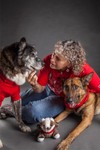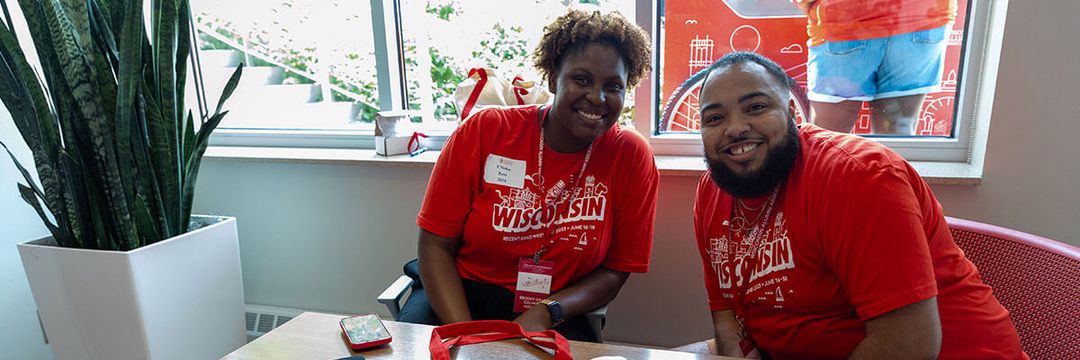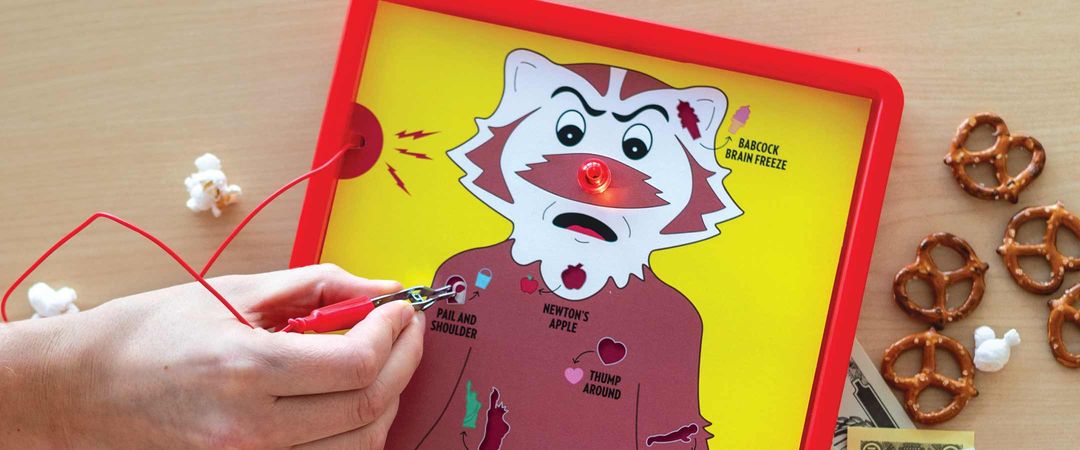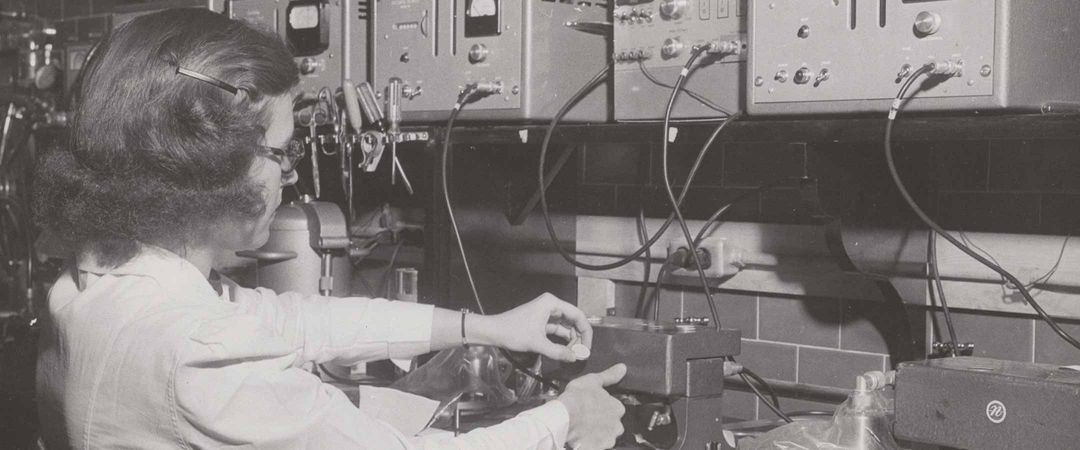Working Like a Dog
Matilda has a challenging job. For one thing, she’s constantly on her feet. She works with people who are dealing with physical, emotional, and mental challenges, and she always has to keep a brave face. If she’s not at the VA’s William S. Middleton Memorial Hospital helping wounded and recovering veterans, she’s traveling around the UW-Madison campus, calming harried students through their exams. But Matilda’s a pro — she’s been doing this for more than half of her life — about three years.
Matilda is a five-year-old Bernese mountain dog.
Matilda, along with more than one hundred canine counselors, put their cuddly skills to use as volunteers for Dogs on Call, one of the few pet-therapy organizations in the Madison area.
Founded in 1999 by five dog lovers, Dogs on Call has become a staple in UW-Madison student life. Human/dog teams visit campus residence halls, libraries, and departments, as well as near-campus study spots such as the Lutheran Campus Center. While Dogs on Call gets requests from student groups throughout the academic year — the Society of Women Engineers put in a request three months in advance — the group’s busiest times are during midterm and final exams.
Even though Dogs on Call is going on sixteen years, the group has been working with the university for only about five. Liz Morrison, the organization’s UW events coordinator, organizes all campus visits. She and Charlotte, a French bulldog, joined Dogs on Call in the fall of 2009. Earlier that spring, a staff member at the College Library in Helen C. White Hall had called to see about bringing teams in.
“We went in to see how things would go, and it was a huge success,” Morrison says. “Then we were asked to come in and go to the dorms. We [went to] five dorms in one night. Huge success!”
Following those trial visits to residence halls, Dogs on Call struck an agreement with the university. Teams now make stops at the Southeast and Lakeshore residence halls, as well as other libraries, including Wendt and Steenbock. Morrison is currently working with University Health Services to set up regular visits to ASK.LISTEN.SAVE, a student organization focused on promoting mental health and suicide prevention.
The first time that Signe Holtz ’73, ’80, MS’85 and her dog, Kyla, visited UW-Madison as a team was on a visit to Steenbock during fall midterms. Holtz, a CALS graduate, had been in the library many times — but under different circumstances.
“I went there, and I really didn’t know what to expect,” she says. “We walked in the door, and before I even had a chance to get my coat off, we were surrounded by students. We eventually found a place to sit, and there was just a steady stream of students with big, happy faces.”
In addition to visiting with UW students, Dogs on Call visits Edgewood College and Globe University. The organization works with children in Madison-area libraries through a program called R.E.A.D. (Reading Education Assistance Dogs), and it sends teams (such as Holtz and Kyla) to the Dane County Juvenile Detention Center. Dogs on Call has also established relationships with the UW, Meriter, and VA Hospitals. The latter took ten years of discussions before agreeing to have Dogs on Call visit. Within the VA Hospital, teams visit three areas: the Community Living Center, which is a hospice and rehabilitation center; Building #6, home of the community drug and alcohol treatment program; and “2B,” the closed psychiatric unit.
To get the contract with the VA, Dogs on Call sent in four of its top teams on a pilot run. Karen Smith ’79, MS’83, PhD’90 was part of that group. She has two certified therapy dogs, Zombie and Shaka, who are both Dutch shepherds. (They have another brother, but he has to stay home “because he’s an idiot,” Smith explains.) Dogs on Call needed animals that could work in the conditions of a psychiatric ward,and Zombie was just such a dog.
“Zombie is a pretty special therapy dog, in that he’s very empathic, Smith explains. “You can just see it.” Smith, Zombie, and Shaka also visit College Library and, like Holtz, they didn’t know what to expect from college students. “It really surprised me the first few times [we went],” she remembers. “It’s like … um, there’s a mob here. They’ve been waiting in line for half an hour, and they’re texting their friends to show up.”
Working in res halls, libraries, hospitals, and psychiatric units is a lot for a dog to handle, but this is what they’re trained to do. All members of Dogs on Call — human and non-human alike — go through training and testing before they can set foot on location. The organization operates under the nationally recognized Pet Partners program. To join, interested humans start with a daylong course that covers basic visiting guidelines, safety, and learning to recognize signs of stress in dogs.
“We want our dogs to be safe, and we want our teams to be safe,” says Morrison. “We also want to advocate for our dogs and make sure we’re not getting them into stressful situations.”
Once the people have completed the course, they sign up to have their animals evaluated. (Dogs on Call is a slight misnomer because the organization also uses a handful of non-canine therapy animals: cats, rabbits, and miniature horses.) There’s a twenty-one-item test that the teams must pass. The dogs go through a hands-on temperament evaluation to see how they handle being grabbed, hugged, and approached by a crowd. The humans are also tested to ensure that they have control of the dog and can react appropriately to stressors.
“Pet Partners has the toughest standards of any of the groups that certify,” Smith says.
It’s not uncommon for teams to have to retake the test — something that Matilda the Bernese knows all about. She passed right away, but her human counterpart, Lance Williston ’95, failed.
“I dropped the leash right in the middle, and you’re never supposed to drop the leash!” he laments. His previous dog, Baloo, was also Pet Partners–certified, so all of the testers knew Lance well. “They always bring it up. ‘Make sure you don’t drop the leash!’”
Once the dog and the human have passed, they go through several rounds of mentored visits until they’re cleared and can sign up for events.
Dogs on Science
Take yourself back five, ten, twenty years. Remember the smell of Helen C. White, the jitters from consuming more caffeine than the FDA recommends. Despite the dread that your work may not get done, you call it: time for a break. You haphazardly toss everything into your backpack, stumble out the front door into the blinding light, and … dogs. Dogs everywhere.
Can you feel the stress melt away? You’re not alone. According to a study cited in the Journal of Psychometric Research, human-animal interactions increase levels of oxytocin, the “happy” hormone that also acts as a neurotransmitter; and decrease cortisol, the “stress” steroid hormone.
Further, the arrival of animals can change an emotional climate, kicking off instant happiness. According to a pilot study on animal-assisted outreach programs, breaking students from their rigid study routine and putting them in a relaxed, unstructured environment helps to relieve stress.
The study surveyed fifty-five undergraduates who voluntarily attended a Dogs on Call–like event at their small liberal arts college. Before they engaged with the animals, they completed several tests and questionnaires, such as the Burns Anxiety Index and the University of the Philippines Loneliness Assessment Scale. After interacting with the therapy dogs, students showed markedly better scores on both tests.
But Dogs on Call doesn’t help just patients and students: it’s also a rewarding experience for the volunteers.
“People say that,” Smith says, “but until it actually happens, you don’t realize how rewarding it can be.”
And it’s a different type of rewarding experience for volunteers who return to their alma mater because they get to share memories and interact with current students. Holtz still laughs about a visit that she and Kyla had at Bradley Hall.
Upon arrival, they discovered that Holtz had lived there as an undergraduate. She hadn’t known exactly where she was going when she signed up, because the building used to be called Elm Drive A. While chatting with a student, Holtz mentioned living there as a freshman. “[The student] just looked at me and looked at me, and finally he said, ‘Just how old is this dorm?’” For the record, it’s only about ten years old. In dog years, that is.
MEET THE TEAMS
Kyla: The Sophisticated One
Kyla is a nine-year-old Irish water spaniel (not a poodle). She and her human, Signe Holtz ’73, ’80, MS’85, have been with Dogs on Call for a year. Holtz, whose bachelor’s is in horticulture and master’s is in landscape architecture, worked for the state’s Department of Natural Resources. “I really wanted to spend some time in my retirement doing some personal things that I’ve always wanted to do,” she says. So she started bicycling, taking piano lessons, and yoga classes, and she joined Dogs on Call. She and Kyla visit UW residence halls and libraries, as well as the Dane County Juvenile Detention Center and Madison-area libraries for the R.E.A.D. program. And while Kyla doesn’t have the outgoing personality of, say, a golden retriever, “she does like people.” Dogs on Call’s UW events coordinator calls Kyla “the princess.” It’s pretty clear that Kyla knows she’s cute. At our photo shoot, she insisted on wearing a bandana.
Matilda: The Loveable Goofball
Matilda’s smile could light up a whole town, and she’s probably more photogenic than Heidi Klum. The five-year-old Bernese has the kind of face that screams, “Please stop what you’re doing and pet me!” She’s proof that therapy dogs do not have to be subdued. “She’s pretty rambunctious the whole time,” says her person, Lance Williston ’95. A civil engineer with KL Engineering, Williston is no newbie to Dogs on Call. Matilda’s predecessor, Baloo, was his first therapy dog. While Baloo visited St. Mary’s Hospital frequently, Matilda prefers doing res hall and library visits. Williston wasn’t at all surprised with Matilda’s model behavior at the shoot — apparently, she’s been the subject of many a selfie. “The social media thing is kind of interesting,” he says. “[The students] are all on their phones, but they’re taking pictures. A lot of what I hear is, ‘I’m sending it to my mom. I’m sending to my dad.’ It’s not, ‘I’m sending it to my friend, Joe.’ They’re sending it back home, which means that they’re having a connection back home.”
Shaka: The Fun Police
Smith calls Shaka “the fun police,” a name he lived up to at our photo shoot. At eleven years old, he’s the oldest canine in the Smith family. And while he tolerates his brothers (much like he only tolerates just about everything else, including the sweater we made him wear), he’s not so keen on other dogs. (Shaka was nearly killed by another dog when he was a puppy.) His aversion to his fellow canines hasn’t been an issue in his therapy work, however. “Part of the test is [that] you have to walk past [another dog] and not threaten to eat it for lunch,” says Smith. Shaka passed with flying colors — perhaps due to the fact that Smith moonlights as a dog obedience trainer. It’s all about focus and self-control, she says.
Zombie: The Quiet One
A ten-year-old Dutch shepherd, Zombie looks a lot scarier than he is. In fact, he looks more threatening than his littermate Casey, a K9 officer with the UW Police Department. Like Casey, Zombie is hardwired to work. “Dutch shepherds are pretty much police or military dogs, and they need jobs,” explains Karen Smith ’79, MS’83, PhD’90, a researcher with the UW’s Center for Dairy Research. Zombie and Smith found out about Dogs on Call at the Mounds Dog Fest six years ago. Basically, Karen was there looking for work for her dogs. “I told my dogs I was tired of [them] sitting home all day, watching Animal Planet, and eating milk bones. They needed to go out and get a job!”













